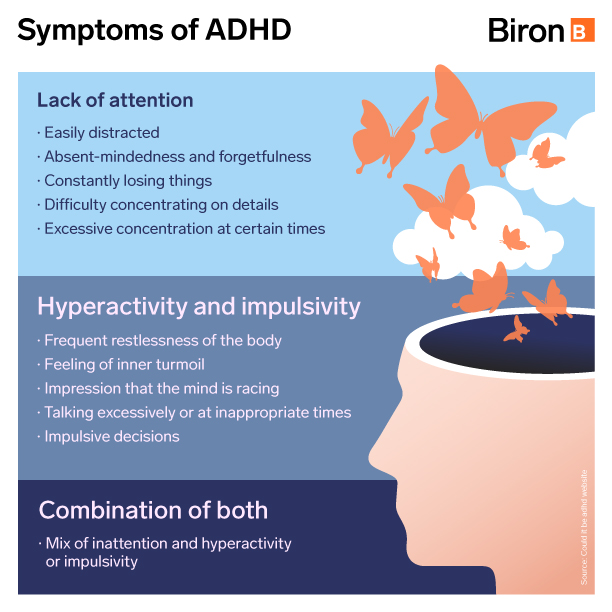Specialist Advice — 9 minutes
Recognizing ADHD in adults

Still unknown to the general public roughly a decade ago, attention deficit disorder with or without hyperactivity (ADHD) is often associated with a problem that only affects children, which is incorrect. In fact, about 50% of children with ADHD will continue to have the disorder as adults [1,2]. However, it is true that ADHD in adults is rarely diagnosed and that many are affected without even knowing it.
Today, approximately 700,000 Quebecers of all ages suffer from ADHD. So, how is it diagnosed? How can we evaluate its severity and find the right solutions to live with it?
Detecting the warning signs of ADHD
ADHD is a neurobiological disorder, which means that it is present from birth. Isabelle Marleau, a psychologist at CHU Sainte-Justine, explains that “there’s a certain continuity in the presence of symptoms, so it’s not a condition that appears ll at once.” [3] ADHD occurs more often in boys, who show signs of hyperactivity, than in girls, who are more likely to be inattentive. [4]
ADHD has several degrees of severity. The severe forms are usually easy to spot, while the milder forms often go unnoticed and are therefore less diagnosed. As a result, many people do not realize that the multiple difficulties they have experienced throughout their lives are actually related to symptoms of an undiagnosed ADHD.
A wide variety of symptoms
The first signs can be observed before the age of 12, and sometimes as early as three years old. These symptoms are divided into three sub-types [5]:

Long-term impact
The symptoms of ADHD are not without their consequences on daily life and can hinder an individual’s personal and professional development to varying degrees.
For some people, school age is when the difficulties become more restrictive. University imposes a greater workload and requires more autonomy and effective time management skills. Finding themselves suddenly overwhelmed, some individuals may cut short their education because of ADHD.
More generally, ADHD can lead to difficulties in task management, social interactions or mood regulation. In the long term, it can also have repercussions on self-esteem and lead to new psychological disorders.
The importance of diagnosis
Other pathologies can sometimes coexist with ADHD and complicate its diagnosis and treatment. Some examples are anxiety, bipolar disorder, depression, drug addiction, and learning or personality disorders.
Some of these disorders may be innate, such as ADHD, or appear later and may or may not be a consequence of ADHD. In all cases, they make the early detection and management of this disorder even more necessary.
How is ADHD treated?
To date, there is no real cure for ADHD. Fortunately, many stimulant-based medications can relieve symptoms and are effective in 70% of cases [6]. The use of medication, however, requires therapeutic drug monitoring to ensure that the patient does not experience side effects such as loss of appetite, sleep problems or increased irritability.
There are also various other complementary methods to help persons suffering from ADHD. These usually involve learning behavioural strategies to improve social skills or manage emotions or tasks at school or at work.
It is also common to combine chemical and psychological treatments to help improve conditions. In all cases, the severity of the ADHD should be carefully assessed to avoid taking medication if the situation does not require it.
Drugs are no longer the knee-jerk solution
Our knowledge of ADHD has greatly evolved over the last few decades. Twenty or thirty years ago, the medical profession tended to prescribe medication somewhat quickly and without an actual diagnosis. Today, however, it is better equipped to assess each case appropriately.
Detailed questionnaires are now available to health care professionals, allowing them to make an informed analysis based on a number of parameters. The vast majority of ADHD cases do not require medical treatment and doctors can refer their patients to other appropriate resources that have been developed in recent years. Many organizations provide support and are open to the public by appointment.
For more information, you can consult the resources available for ADHD in Quebec.
For professional support, we’re here for you.
We provide services that can help your doctor determine the right medication at the right dose to treat ADHD.
Do you have a medical prescription for one of these tests? Book an appointment online or contact Biron Health Group’s customer service at 1 833 590-2712.
Sources6
- Faraone, S.V., Biederman J. and Mick E. (2006). “The age-dependent decline of attention deficit hyperactivity disorder: a meta-analysis of follow-up studies.” Psychological Medicine,. 36(2): p. 159-165.
- Wilens, T.E., Faraone, S.V., and Biederman J.(2004). “Attention-deficit/hyperactivity disorder in adults.” JAMA, 292(5): p. 619-23.
- CHU Sainte-Justine. (February 8, 2018). “Les signes précurseurs – Troubles déficitaire de l’attention avec ou sans hyperactivité.” https://www.chusj.org/fr/soins-services/T/Trouble-de-l-attention/Caracteristiques-et-signes/Signes (in French)
- Mayo Clinic (June 25, 2019). “Attention-deficit/hyperactivity disorder (ADHD) in children.” https://www.mayoclinic.org/diseases-conditions/adhd/symptoms-causes/syc-20350889
- Could it be ADHD? (s. d.). “What you should know about adult ADHD.” https://www.coulditbeadhd.ca/adultADHD101
- Caring for Kids. (May 2019). “Medications for attention-deficit hyperactivity disorder.” https://www.caringforkids.cps.ca/handouts/behavior-and-development/medications-for-attention-deficit-hyperactivity-disorder
Biron offers exclusive content on genetics.
Are you curious? Get unmatched expertise and knowledge from our experts in our Education Center.









